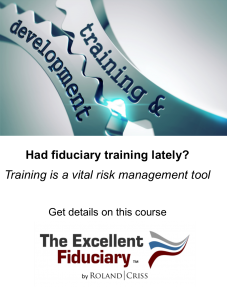Article
Knowledge is Vital
The U.S. Department of Labor (“DOL”) has called for increased training for people who occupy the primary position of trust for employer-sponsored retirement plans.
While a good heart is a desirable trait in fiduciaries, the DOL stresses the vital role that knowledge plays for executives and managers who typically lack academic or formal education in the prudence principles that dictate fiduciary conduct under the Employee Retirement Income Security Act (“ERISA”). Continuous training is the solution for acquiring and maintaining the needed skills.

Who Should Get Training?
If you’re a recently appointed member of an employee benefit plan committee, or if you’re a member and it’s been more than a year since you received formal training, find a source that offers comprehensive instruction in all the fiduciary disciplines. Maintain your skill level with periodic updates.
What the Training Should Cover
ERISA requires fiduciary competence in five categories:
Foundational guidelines shape ERISA’s overarching mandate for prudent decision-making.
Governance
Simply put, “governance” means the decision-making process and the methods by which fiduciaries implement decisions. A proper governance strategy implements systems to monitor and record what is happening. The “Plan Document,” an Investment Policy Statement, and a Data Security Policy are examples of instruments that define a structure for those processes and methods.
Administration
The Administration discipline requires periodic assessment of all of a benefit plan’s fiduciaries, internal and external. The practices needed to prove prudent administration of an ERISA plan embrace support staff, service providers, reporting to the federal government and plan participants, information systems, data security, and accuracy of payroll and the plan’s transactions.
Investments
ERISA does not hold retirement plan fiduciaries accountable for achieving the best possible returns in any given vehicle that comprises the investment options in a plan. That’s a frequently held myth that can get committees in trouble. Instead of investment performance, fiduciaries are accountable for managing an investment decision-making process. That includes selecting the asset classes that best represent the needs of the participants, the choice of consultants and investment managers, and the funds they offer.
Controls
Controls help protect an ERISA plan’s participants’ assets while at the same time increasing the efficient handling of the assets. Controls embrace financial, data, and physical premise security. Control procedures aim to o preempt mistakes or deviations from best practices, detect variations when they occur, and take corrective action.
The Benefits of Fiduciary Skill Development
The time spent developing relevant skills creates leverage for executives with multiple assignments. It also provides assurance that forms confident decision-making with the following benefits:
- It sets a solid foundation for doing the right things the right way.
- Clarifies the murky conduct principles in ERISA and how the courts apply them in breach of fiduciary duty cases.
- Introduces a measuring stick to track ongoing improvements in a retirement plan’s management.
- Identifies the most sensitive fiduciary issues and how to handle them.
- Defines guidelines for monitoring third-party service providers, including cybersecurity issues.
Where to Get Professionally Developed Training?
The Excellent Fiduciary training program from Roland|Criss is self-paced and contains recently added units, so don’t allow your knowledge of the disciplines needed to perform your role safely to grow stale.
Download the program description here and contact us when you’re ready to enroll.




